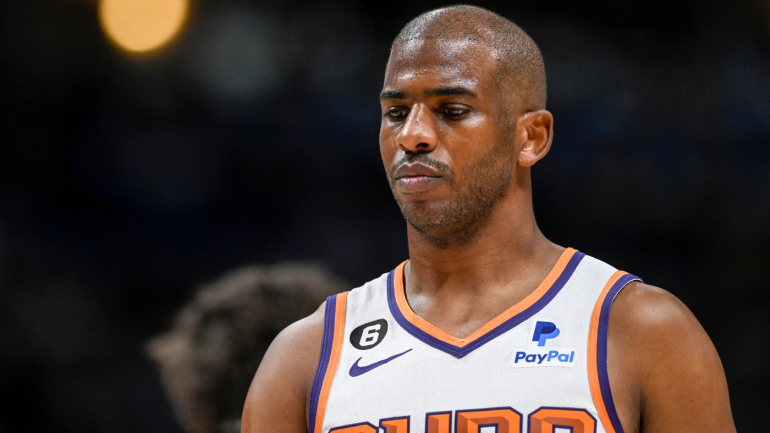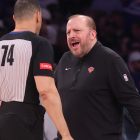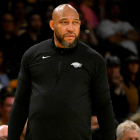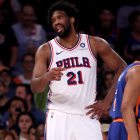
Why would the Phoenix Suns waive Chris Paul? There's a short answer to that question that we know, and there's a long answer to that question that we don't. Here's the short answer: the Suns are waiving Chris Paul because he is not worth the $30.8 million that he is owed next season. Paul averaged a career-low 13.9 points per game last season. His defense declined considerably. He once again struggled to stay on the court in the playoffs. Paul may be an NBA legend, but there simply isn't a team in basketball that can justify paying him that much anymore.
The Suns, fortunately, had an out. Only $15.8 million of that figure is guaranteed, and Phoenix can use the stretch provision to spread those payments over the course of five years so long as they are comfortable with the fact that doing so would prevent them from re-signing Paul at any point during the terms of his original contract. On a fundamental level, waiving Paul is a declaration that Phoenix would prefer to have Paul off of its roster on a $3.2 million cap charge than on it at $30.8 million. Plenty of other teams would make the same decision. That is our short answer here.
The long answer is harder to parse. Mat Ishbia just bought the Suns at a $4 billion valuation. He's not saving money for the sake of saving money. If the Suns waive Chris Paul, it's because they believe they can better allocate the $27 million waiving him would free up on the basketball court. How exactly they plan to do that is less clear.
The Suns have no simple path below the salary cap. The projected cap for next season is $134 million. Kevin Durant, Devin Booker and Deandre Ayton alone will combine to make more than $116 million next season. Even if the Suns dumped everyone else and stretched Paul, the stretched portion of his salary combined with incomplete roster charges would effectively bring the Suns back up to the cap.
If they could move Ayton without taking back any salary in addition to waiving Paul and getting off of Landry Shamet and Cameron Payne, the Suns would be looking at roughly $36 million in space. Is that enough to gut the entire roster around Durant and Booker? Probably not. That sort of space is probably enough for two high-end starters or one premium addition. Does Fred VanVleet really move the needle that much? Does Khris Middleton? After adding such a player, the Suns would be limited to the $7.6 million cap room mid-level exception and minimum salaries to fill out the rest of their roster. In all likelihood, cap space isn't a feasible option here. Even if Phoenix wanted to take this route, finding an Ayton trade that didn't involve taking back salary would be extremely difficult.
A more realistic path to a major free agent addition would probably be a sign-and-trade. The major restriction that comes with executing one would be the hard cap a sign-and-trade generates. Teams that acquire a signed-and-traded player cannot exceed the first apron for any reason. That figure is projected to come in at around $170 million next season. The foursome of Durant, Booker, Ayton and Paul would have combined to make roughly $147 million next season with Paul on his original salary. Factoring in the new salary of a sign-and-trade acquisition, remaining below the hard cap would have been impossible.
But drop Paul's cap charge from $30.8 million to $3.2 million and a sign-and-trade suddenly looks more realistic. Imagine, for instance, that the Suns want to pursue Kyrie Irving. They could match even a max salary in a trade with Ayton, Shamet and Payne. The trio of Durant, Booker and Irving on his max salary would cost Phoenix $130.6 million. Throw in Paul's dead cap charge and the Suns would still have around $35 million in salary to play with below the hard cap line. That's not a lot, but it's not nothing, either. They could then use a portion of the non-taxpayer mid-level exception on a fourth starter-level player in free agency, and build out the bench with minimums from there. It wouldn't be an especially deep team, but perhaps the Suns would consider such a talented trio at the top to be worth the risk.
A similar albeit slightly cheaper version of this approach would involve an Ayton-for-Draymond Green swap with the Golden State Warriors. Green is the better player of the two, but Ayton is younger and can play a role Golden State has been trying to fill for years as a vertical spacer. Green attended Michigan State, Ishbia's alma mater, so there is likely a connection there, and new head coach Frank Vogel would surely love Green as the fulcrum of his defense.
The same basic logic could apply to any other free agent, though no other teams offer Ayton as clean a landing spot as Dallas. Phoenix has been linked to James Harden, for instance, but don't expect the 76ers to seek Ayton in a sign-and-trade with Joel Embiid already in place. The same applies to Milwaukee with Middleton, as Ayton is hardly a clean fit next to Giannis Antetokounmpo even if Brook Lopez walks. Toronto was likely interested in an Ayton-for-VanVleet swap at one point, but with Jakob Poeltl in place, such a move is less likely today. For Phoenix to pursue one of these players, a third team would probably have to be involved.
These are the more ambitious versions of Phoenix's long game. Here's a simpler possibility: the depth-strapped Suns believe they can do better using the two cap exceptions waiving Paul would generate (the non-taxpayer mid-level exception and the bi-annual exception) than they could by keeping Paul. There's a credible argument behind that idea, especially now that the new CBA takes away the taxpayer mid-level exception for teams that go above the second apron. Phoenix likely would have fallen under that umbrella with Paul.
Without him? They're theoretically far enough below the first apron's hard cap to use those two exceptions on outside free agents. The bi-annual exception at around $4.5 million won't do much besides give Phoenix a leg up on a preferred minimum-salary target. But the $12.2 million non-taxpayer mid-level exception? That's a bit heftier. Imagine a world in which the Suns are prepared to move forward with Cameron Payne as their starting point guard. Suddenly that exception could sign them a viable 3-and-D to play alongside Durant and Booker. It could also get them a replacement center if they ultimately decide to trade Ayton.
They could even explore point guards with that exception if they aren't comfortable starting Payne. Is playoff hero Gabe Vincent gettable at the mid-level exception? Considering Miami's impending tax problems, it can't be ruled out. How about Booker's longtime friend D'Angelo Russell? It's not likely, but if the Lakers choose to pursue a different point guard (cough cough Paul cough cough), it can't be ruled out. These aren't better players than Paul, but they're younger and perhaps provide more of what Phoenix is looking for around Booker and Durant.
Technically, the Suns could also use that mid-level exception to bring back Paul if he's interested in a reunion. In this scenario, they would not be able to spread out the dead money on his original cap hit over extra seasons, but they could still keep him at a lower number. Bringing Paul back at the full mid-level exception would save the Suns roughly $3.6 million compared to simply keeping him on his original deal. Such savings might not seem like much, but they're pretty important if the Suns plan to duck the second apron.
Doing so would allow them to absorb 125% of their outgoing salary in trades this season rather than the altered 110% that teams above the second apron will have access to this season. Starting in the 2024-25 season, those restrictions get even more severe. There will be teams that treat the second apron line as an effective hard cap for that exact reason. The flexibility it will deprive teams of is going to make building a deep, competitive roster significantly more difficult. The Suns would be wise to avoid it at least until they feel comfortable in their roster's ability to win a championship.
It's too early to tell what exactly the Suns are planning. Here's what we can say somewhat comfortably: Phoenix wouldn't waive Paul without a good reason. He's still a starting-caliber player. No team ever wants to eat $15.8 million in dead money. His $30.8 salary, which can function as an expiring deal thanks to its non-guaranteed 2024-25 season, could have been a valuable enough trade chip to at least help the Suns absorb another team's bad contract.
If the Suns do ultimately decide to waive Paul, it will be because they have a firm plan in place that requires the extra financial wiggle room that only waiving him can provide. In other words, if the Suns really do this, they're up to something. We don't know what it is yet, but it would likely have to be pretty substantial to allow Chris Paul to walk for nothing.






















